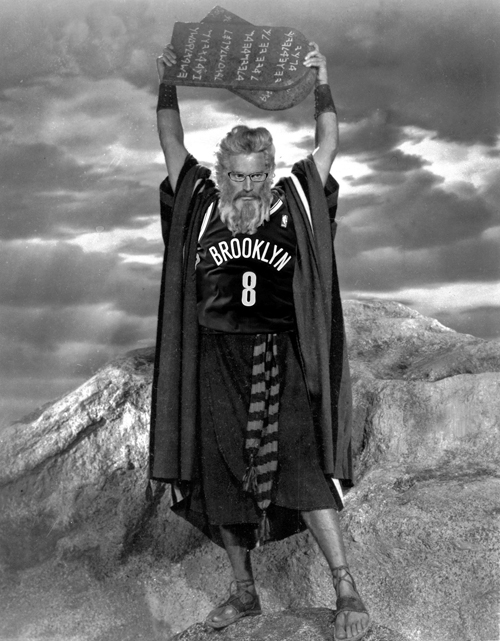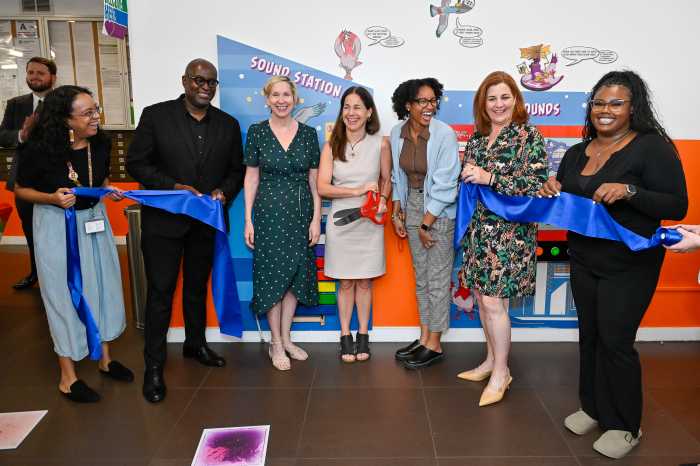Park Slope churchgoers stepped out of mass on Palm Sunday clutching their blessed reeds and wearing their pre-Easter finest, but little did they know a modern-day revelation at Mount Sinai was underfoot nearby.
The borough humanists at the Brooklyn Society for Ethical Culture had gathered just blocks away to unveil a more Brooklyn-appropriate version of the Ten Commandments — not a “thou” or a “shalt” in the lot.
In fact, secular clergy leader Catherine Bordeau only came up with six rules — if you could call them that.
“I don’t really like to do lists,” she warned first, before offering up her commandments (printed in full below) in a scene that couldn’t have looked more different than Charlton Heston’s tablet-wielding tableau in “The Ten Commandments.”
The Brooklyn commandments are less clear-cut than the ones Moses brought down from the mount, which isn’t so surprising considering that the congregants at the church of reason on Prospect Park West — who can be described broadly but perhaps too simply as ethically minded atheists — work off of barely agreed-upon precepts rather than universal traditions.
Out go the clear-cut directives, including all the bits about killing, false idols, and the neighbor’s wife.
In comes a new emphasis on nature, a nod to evolution, a push for self-reliance and self-actualization, an increased value in the individual, and a big downplay of the big guy himself (or herself).
“There is no evidence that we receive support or guidance from any immaterial power with whom we might imagine exists,” the second Brooklyn commandment reads. “There is something to that.”
The new guideline makes no mention of the word “god” or “lord,” with the borough’s fifth commandment reminding readers that “Moral codes are made by humans.”
The revised commandments weren’t received without criticism: one attendee said they are too human-centric and instead should remind Brooklynites that people are just one creature of many.
But members of the humanist group, which meets every Sunday in a gorgeous church-like building with stained glass windows depicting boats instead of saints, seemed supportive of the human-crafted code, at least if the extraordinarily civil time for comment that followed the speech is any indication.
“The Gods have not spoken,” Bordeau said conclusively, wrapping up her sermon.
The Brooklyn Society for Ethical Culture’s new commandments
1. Humans are in every respect a part of nature. They are natural products of evolutionary processes.
2. We humans, like all other living things, must rely upon ourselves, one another, and nature. There is no evidence that we receive support or guidance from any immaterial power with whom we might imagine exists. There is something to that.
3. We are able to meet the challenges of life in constantly more satisfying ways provided that we are able to make fuller use of all of our capacities. How do we act in this world? Can we reach our best selves?
4. The meaning of life is that which we give to it. Happiness and self-fulfillment for oneself and others are richly sufficient life goals.
5. Moral codes are made by humans. Values and ideas grow out of the experiences of various cultures, societies, and individuals.
6. The supreme value is the individual human being. Each person, of whatever race or condition, merits equal concern and opportunity. Laws, governments, and other institutions exist for the service of men and women, and are just valuable only as far as they contribute to human well-being. Fundamentally, humanism is concerned that through intelligent cooperation, that we live good, humane lives. That we maintain positive relationships with friends, family, and community. That we lessen poverty, war, disease, male domination, and prejudice. And that we provide opportunities for, and sustain, young people while creating community — thriving community. The welfare of each of us is dependent on the welfare of all of us…. We do not have to believe the same things, but we recognize our common humanity, and the need to balance our lives with nature’s resources.

























